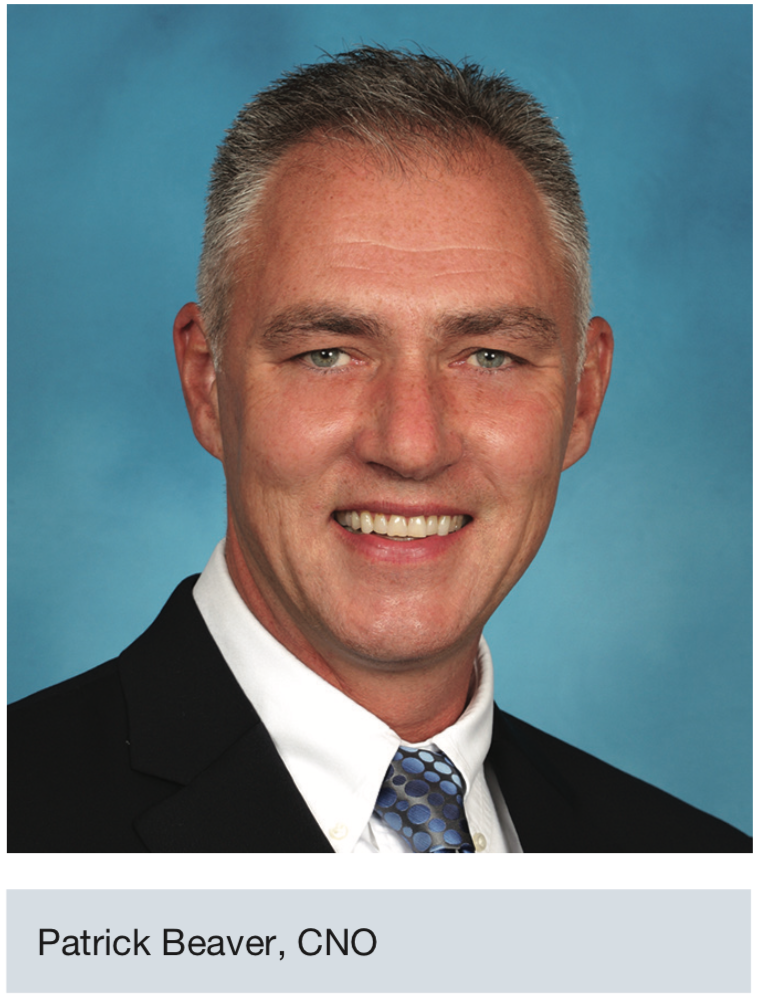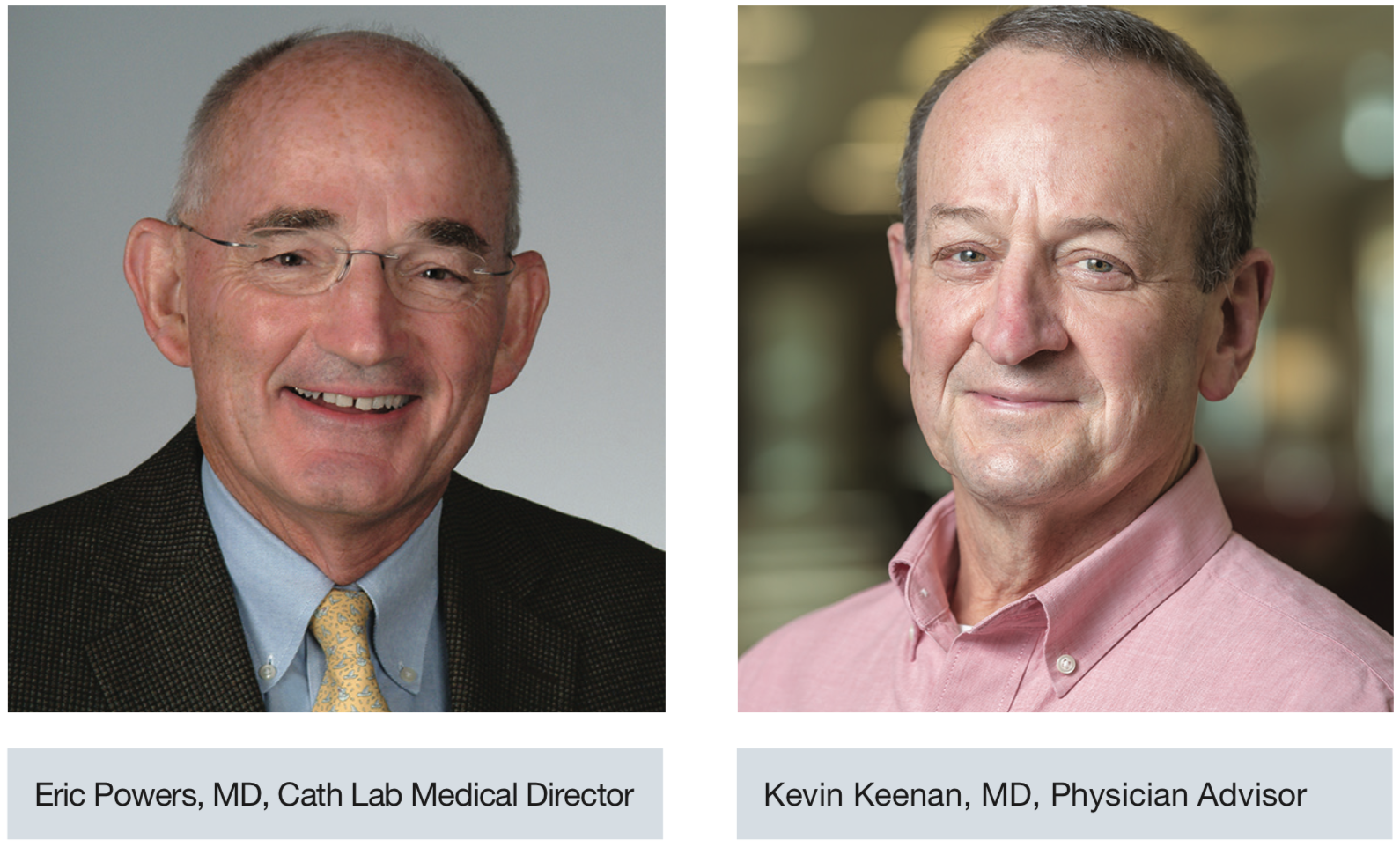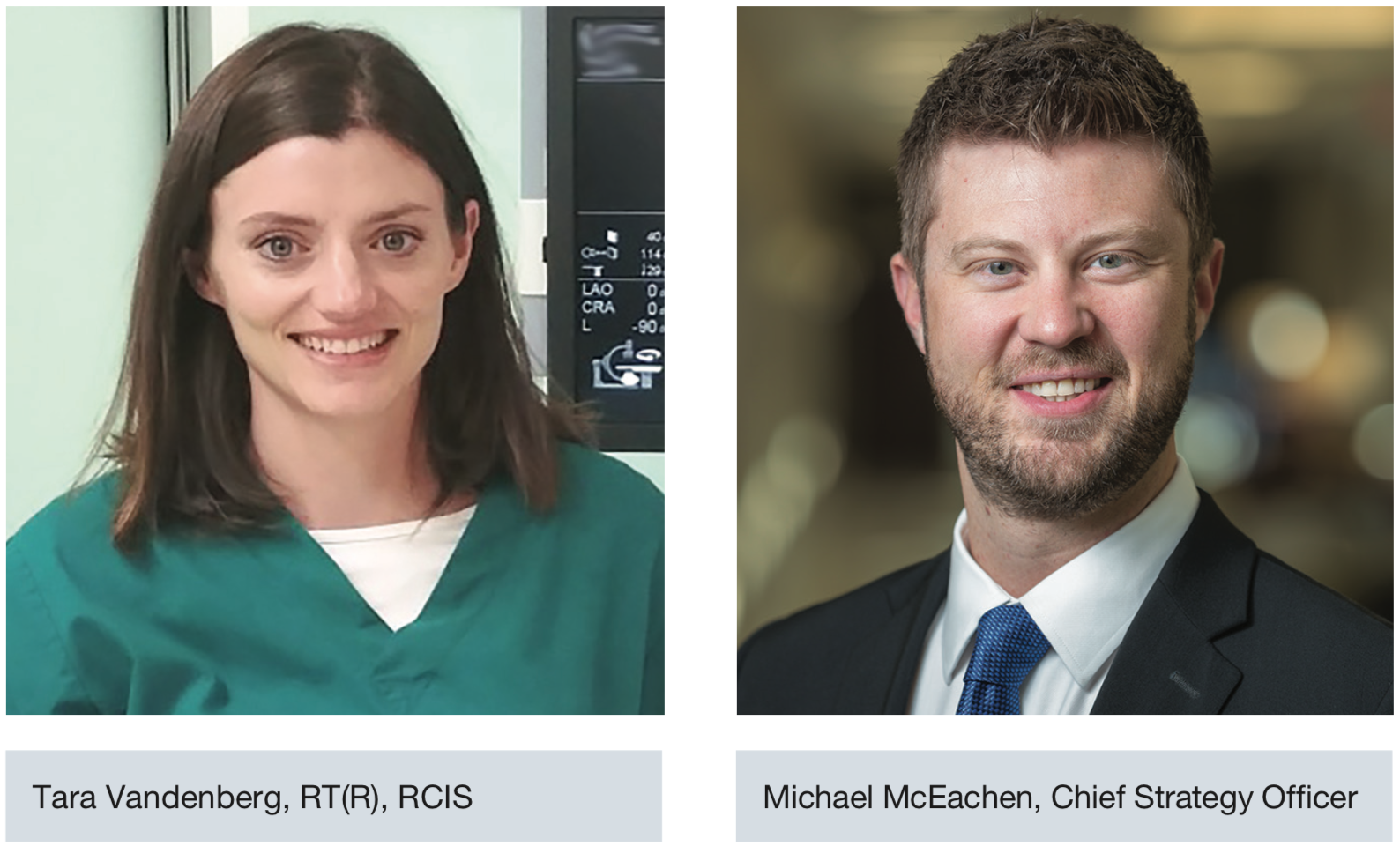Spotlight: East Cooper Medical Center Cardiac Cath Lab
 Tell us about your cath lab. Is it part of a cardiovascular service line?
Tell us about your cath lab. Is it part of a cardiovascular service line?
Yes. Our new cardiac catheterization lab is part of our cardiovascular service line. Cardiology is a service line that East Cooper is focused on expanding to better serve the needs of our community. Our new lab officially opened in February 2018. The cath lab is physically located in our department of radiology, located within our main hospital building.
What is the size of your cath lab facility and number of staff members?
Our cath lab also serves as an interventional suite for radiology and we are fortunate to have a total of four highly skilled, dedicated staff for this area. Currently, three staff members are trained in both cardiac cath and interventional radiology procedures. At the time of the cath lab opening, we hired two staff members specific to the cath lab. As the program develops, all cath lab staff members will be trained to do both cardiac cath and interventional radiology. Both our nurses and our technologists are experienced and motivated to help us further grow and develop our service offerings.
What procedures are performed in your cath lab?
 We offer diagnostic cardiac caths and pacemakers. We also offer procedures for vascular stenting including aortic stents and renal stents; basically, we are able to offer most non-cardiac-related vascular procedures in our lab. It is important to note that our new lab is the only cath lab in the city of Mount Pleasant. This is key for patients and physicians who previously had to travel into Charleston, South Carolina for this service, and who can now respectively receive and provide this care closer to their homes. This also saves valuable treatment time. As a brand-new lab, we don’t yet have statistics to share from a historical perspective, but our experienced cardiologists and interventionalists from within our community have expressed that our ability to provide this service fills a major community need for our population, and we are already considering opportunities for future expansion.
We offer diagnostic cardiac caths and pacemakers. We also offer procedures for vascular stenting including aortic stents and renal stents; basically, we are able to offer most non-cardiac-related vascular procedures in our lab. It is important to note that our new lab is the only cath lab in the city of Mount Pleasant. This is key for patients and physicians who previously had to travel into Charleston, South Carolina for this service, and who can now respectively receive and provide this care closer to their homes. This also saves valuable treatment time. As a brand-new lab, we don’t yet have statistics to share from a historical perspective, but our experienced cardiologists and interventionalists from within our community have expressed that our ability to provide this service fills a major community need for our population, and we are already considering opportunities for future expansion.
Do any of your physicians regularly gain access via the radial artery?
 Yes, our physicians primarily gain access through the radial artery.
Yes, our physicians primarily gain access through the radial artery.
If you are performing peripheral vascular procedures, do any operators utilize pedal artery access when appropriate?
Our vascular team is qualified to utilize pedal artery access when appropriate and they are skilled for any kind of radial access.
Who manages your cath lab?
 Our cath lab has a director who reports through our department of radiology, and then ultimately to Patrick Beaver, our Chief Nursing Officer.
Our cath lab has a director who reports through our department of radiology, and then ultimately to Patrick Beaver, our Chief Nursing Officer.
Do you have cross-training? Who scrubs, who circulates and who monitors?
The cath lab team is truly a cohesive group of nurses and technologists who offer care up to the scope of their licenses. A nurse will monitor the patient, but a tech will manage the control panel during a procedure.
Which personnel can operate the x-ray equipment (position the II, pan the table, change angles, step on the fluoro pedal) in your cath lab?
 In South Carolina, the laws are very clear. Only trained radiology professionals and/ or physicians can operate the equipment.
In South Carolina, the laws are very clear. Only trained radiology professionals and/ or physicians can operate the equipment.
How does your cath lab handle radiation protection for the physicians and staff?
The health and wellness of our staff is a top priority and we take their safety very seriously. We require all of the standard protocols including vests and collars, and all staff in this department use radiation exposure badges.
What are some of the new equipment, devices and products recently introduced at your lab?
Some of our newest equipment at East Cooper includes balloon pumps and an upgraded physiological monitoring system.
How does your lab communicate information to staff and physicians to stay organized and on top of change?
 Communication is key in our organization. It is the culture of our leadership to keep staff informed and to receive valuable feedback for improvements. We do daily safety huddles, host regularly scheduled staff meetings, and also provide written communications of key changes and updates. We also have a cardiac cath lab committee that meets weekly for this particular service. It consists of our medical director, Dr. Eric Powers, nursing, business development, quality and education.
Communication is key in our organization. It is the culture of our leadership to keep staff informed and to receive valuable feedback for improvements. We do daily safety huddles, host regularly scheduled staff meetings, and also provide written communications of key changes and updates. We also have a cardiac cath lab committee that meets weekly for this particular service. It consists of our medical director, Dr. Eric Powers, nursing, business development, quality and education.
How is coding and coding education handled in your lab?
Our team has been trained as part of ICD-10 implementation and the topic of coding is a regular agenda item at the cardiac cath lab committee.
Who pulls the sheaths post procedure, both post intervention and diagnostic?
 Nurses in the intensive care unit (ICU) and cath lab can both pull sheaths for our cath lab patients. They have been trained by the vascular device representatives and undergo annual competencies.
Nurses in the intensive care unit (ICU) and cath lab can both pull sheaths for our cath lab patients. They have been trained by the vascular device representatives and undergo annual competencies.
Where are patients prepped and recovered (post sheath removal)?
Once the sheath is removed, patients stay in the cath lab recovery area. Should they require a more prolonged observation, they are moved to the ICU.
How does your lab handle hemostasis?
Our lab handles hemostasis manually and patients either stay in the cath lab or get transported to the ICU.
How is inventory managed at your cath lab? Who handles the purchasing of equipment and supplies?
The director of the cath lab and the staff are all responsible for inventory and supply management. We do have some items that are stocked on consignment.
Do you have any plans for expansion?
We are pretty new, so we have plenty of room to expand at this point. Our medical staff is very excited as we have plenty of openings to offer care to patients from a time perspective. We know that those slots will all begin to fill up as our program matures, so we are looking now at what we want our budding program to grow into. Our plan is for our diagnostic cath lab to lay the foundation to lead into chest pain accreditation in the next year. Future plans beyond that would include becoming an interventional cath lab.
Who transports patients to the cath lab during regular and off hours?
We are not receiving ST-elevation myocardial infarction patients at this time, but cardiac cath patients will be transported by a private advanced cardiovascular life support (ACLS) ambulance company and a nurse.
What measures has your cath lab implemented in order to cut or contain costs?
Our cath lab is new, so we developed all of our processes with cost containment in mind. One of the biggest things we are doing is stocking high-ticket items on our shelves by consignment, especially items with an expiration date. As part of a larger organization, Tenet Healthcare, we benefit from the buying power of the system.
What quality control measures are practiced in your cath lab?
We are reviewing 100% of all of our cases using best practice algorithms, considering medical necessity, and doing follow-ups. While our lab is new, our community physicians and staff are highly experienced, and East Cooper is able to benefit from clinical expertise around the country, and benchmark against other facilities as part of Tenet Healthcare’s network. Our goal is to ensure 100% of our cases undergo quality review.
How do you determine contrast dose delivered to the patient during an angiographic procedure?
Contrast dose is determined by the physician in our cath lab.
Are you tracking the incidence of contrast-induced acute kidney injury in patients?
The physician makes acute kidney injury determinations, but we also monitor and review kidney function pre and post procedure.
How are you recording fluoroscopy times/dosages?
Our system and equipment allows us to automatically calculate fluoroscopy times/dosage.
What is the process that occurs if a patient receives a higher than normal amount of radiation exposure?
If there was to be a patient with higher than normal radiation exposure, it would be recorded by the physician in the post-op record and then transparently discussed with the patient, including any follow-up required.
Who documents medication administration during the case?
One of our cath team members records during the cath as the monitor tech; another team member documents medication administration during our cath lab cases.
Are your physicians dictating their cath procedure reports, or do they use a structured reporting tool?
Our physicians use the PowerScribe 360 Recording System (Nuance), which allows for templates that can be filled in by the cardiologist. It is part of a comprehensive cath lab workflow infrastructure designed to help with efficiency and productivity, and offers the ability to care for patients more effectively. From imaging to recording to IT, everything works as one. The system captures key information that becomes part of the patient’s medical record. It also gives data to the interventionalist for their procedural note.
Do you use the American College of Cardiology National Cardiovascular Data Registry (ACC-NCDR) or any other outside data collection registry?
We plan to going forward. Data input will be the responsibility of our quality department.
Can you tell us more about the advantages of having a cath lab available to citizens of Mount Pleasant?
A cardiac cath lab within Mount Pleasant was a major need of our community. Our cardiologists and interventionalists in our neighborhood were having to travel outside of the city to care for their patients into downtown Charleston, where traffic and parking are major issues. Treatment time is more optimal when patients don’t have to travel for care, and we know our population will greatly benefit from us offering this service closer to their homes.
How are new employees oriented and trained at your facility?
One of our best assets is our people, and we want to start off their employment experience on the right foot. There is hospital-wide orientation for all employees and then a clinical pathway for certain departments. We offer a combination of didactic or classroom-based instruction that is combined with hands-on training.
What continuing education opportunities are provided to staff members?
We want our staff to be as up-to-date as possible on all of the latest and greatest in their fields. They have outside educational opportunities afforded to them, as well as assessments by internal staff and providers. We also believe that our goal of 100% review of all cath lab cases will provide direction for educational needs moving forward, and we meet all regulatory requirements.
How do you handle vendor visits to your lab?
All vendors must go through our materials management department. Our cath lab is a restricted badge access area, but vendors may come in when needed.
How is staff competency evaluated?
Our staff competency is evaluated in a variety of ways including from the trainer perspective. Major interventional competencies are determined by the medical director, the chief nursing officer (CNO), or the cath lab director.
Does your lab have a clinical ladder?
A clinical ladder is coming soon to East Cooper! We plan to start with nursing.
Do you require your clinical staff members to take the registry exam for Registered Cardiovascular Invasive Specialist (RCIS)? Does staff receive an incentive bonus or raise upon passing the exam?
We have one technologist who is a certified RCIS, and we are looking at all staff members becoming certified. They would get an economic incentive as part of the clinical ladder for achieving this important certification.
What do you like about the physical space you work in?
Simply put, our hospital is gorgeous! We offer free on-site parking and our location is incredibly convenient. Our cath lab is new, but so is our hospital! Our physical plant was built in 2010, so it has many amenities and modern conveniences not generally found in hospitals. The space we work in is important, but our success is due to our people that fill it. Our organization is dedicated to a high level of customer service, and those who enter our doorways are greeted with southern hospitality!
How does your lab handle call time for staff members?
We have 24/7 call coverage and our expectation is that staff have sufficient downtime for rest and travel. They do need to be able to arrive at the lab within 30 minutes.
Do staff members have any little or big perks that you might like to share?
Parking is free at East Cooper, and staff education is provided and individualized. We offer many employee incentive programs and we are dedicated to investing in our people, first and foremost, as part of our organizational culture.
Has your lab recently undergone a national accrediting agency inspection?
We will undergo accreditation when we formalize our chest pain program.
What trends have you seen in your procedures and/or patient population?
As a new lab, we know there is a need in our community as patients and physicians are having to travel out of the area for this service. Our community is unique in that it is a very young, highly educated population. The average age is 47, so with such a young population, the ability to save time and offer quicker access to care could be very beneficial for them in the long-term.
What is unique or innovative about your cath lab and staff?
Our actual lab may be new, but our experience comes from our medical staff and employees who share a combined skill and knowledge level that rivals others in the area. Patients in Mount Pleasant will see their same cardiologist or interventionalist that they currently see, but now, they don’t have to travel out of the city for cath lab services.
What’s special about your city or general regional area in comparison to the rest of the U.S.? How does it affect your “cath lab culture”?
Our cath lab culture transcends any one department. We are committed to excellence and we invest in our people and our community to keep healthcare moving forward. We are a unique community in terms of demographics — young, highly educated, health conscious — but what truly sets us apart is offering high-quality healthcare with the southern hospitality the area is known for.
Patrick Beaver can be contacted at patrick.beaver@tenethealth.com.










